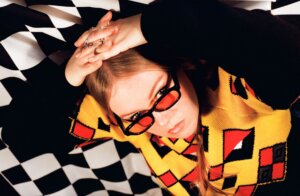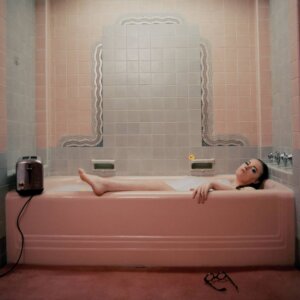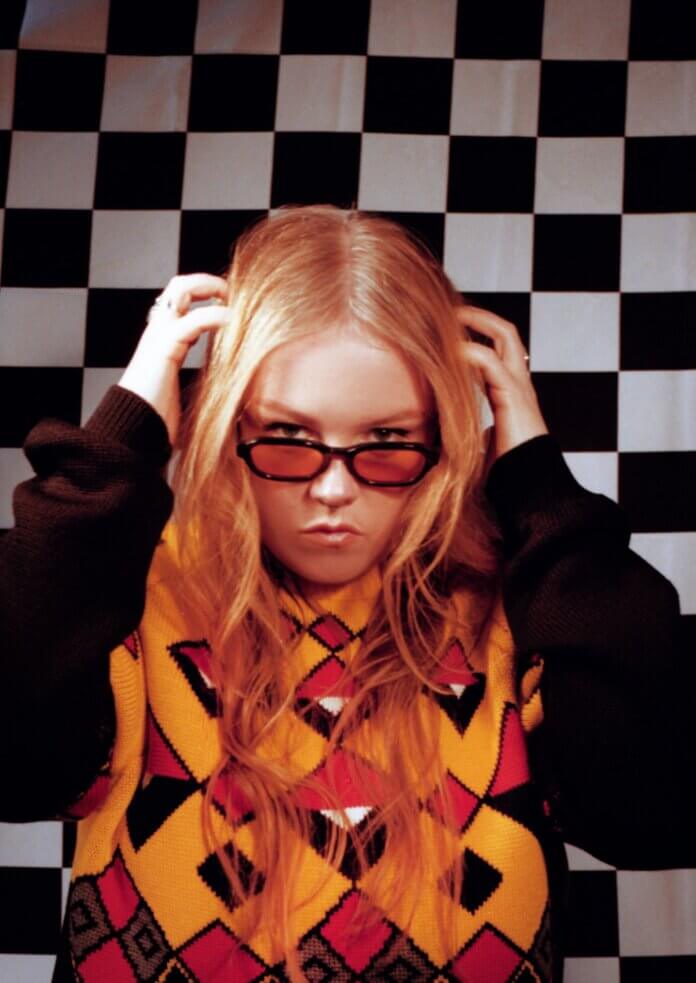Why did you choose Weirdo as the title of your album? Can you tell us how the idea for this record came about?
Originally, the concept was about embracing and celebrating the things that make me weird. I wanted to honor what it meant to grow up feeling like an outsider, being neurodivergent – living with autism and ADHD. These things caused a lot of pain, but they also shaped who I am. They make me unique, and I wanted to celebrate that.
But then everything changed. I suddenly lost my partner, and my life fell apart. Everything became hell. Still, I think the album’s initial concept of acceptance carried through – it became about resilience, survival, and inner strength. What started as a record about accepting my mental health challenges became a diary of mourning and self-discovery in the depths of despair.
At one point, I was struggling so badly that I didn’t want to be here anymore. I didn’t create anything for six months. Then I started making music again, and it became my therapy – deeply healing and cathartic. I locked myself in the studio for a year and did everything alone: I played every instrument, wrote, recorded, mixed. That album became crucial to my mental health.
In a way, we all heal through music – whether we’re making it or listening. For me, making Weirdo was vital to my healing.
Is the album dedicated to someone in particular?
Not really. It’s not dedicated to anyone else. It’s about my journey, my process. In a way, I’d say it’s dedicated to myself. It’s like saying: “I’m still here. I’m still doing this. I’m putting everything I have into the music.” That’s where it begins.
Reading the track titles, I wondered whether Weirdo might be a concept album. Is it?
Most of the songs were written after my partner passed away, though a few were written earlier. Still, there’s definitely a consistent thread – mental health struggles and the comfort I find in music.
The tone of the record comes from the same emotional space: balancing darkness with joy. The music is often playful, even if the lyrics are heavy. So yes, if you want to call it a concept album, that makes sense to me.
Why did you choose “Wanna Die” as the lead single? Was that decision based on the music or the lyrics?
Both. I felt “Wanna Die” encapsulated the whole record. It’s the track I wanted people to hear first. The lyrics are dark and painfully personal, like a diary entry. But they’re set against this vibrant, even humorous musical backdrop. There are short drum solos – just two bars long – and the ending explodes into distorted, pop-punk guitar chords that invite headbanging and release.
That song holds the essence of the whole album’s sound world. I thought: “This has to be the first single. It shows everyone what to expect.”
I haven’t seen the video for “Wanna Die,” but I know you directed it yourself. What’s the concept behind it?
I really wanted to show people my sense of humor. Dropping a track called “Wanna Die” is intense, so I wanted to balance that.
The video draws from some of my favorite joyful, silly references. One was a ’90s UK comedy show called The Fast Show, which had a sketch called Jazz Club – a parody of jazz culture. I also drew inspiration from Outkast’s “Hey Ya!” video, with its technicolor vibe and the same person playing every band member.
That kind of absurdity felt like the perfect counterweight to the song’s darker lyrical content. And it mirrored what I did on the record – playing every instrument. I’ve never really talked about that before, and this record felt personal enough that I wanted to show it. Like, “Yes, I did all of this.”

One surprising track is “Stay” – it’s soulful and ends with a rock edge. Will that be the next single?
I’m not sure. Someone suggested we release it as a single, but honestly, it’s emotionally exhausting to perform. You can hear it in the lyrics. I’ve played it live a couple of times and it’s gone over well, but doing it night after night would be tough.
It’s a song I love, and I think it captures a big part of the album’s sound. But it’s not easy to sing repeatedly. That’s why I didn’t want it as a single.
Did you really do everything on the album yourself?
Yes. Absolutely everything. I played every instrument, wrote every part, recorded, produced, mixed. It’s all me.
The only exceptions are two collaborations: Reggie Watts appears on “Black Hole,” and Kassa Overall features on one track. Aside from that, no one else touched the record.
How will you handle performing this album live, since you can’t play everything at once?
Yeah, unfortunately, I haven’t grown extra arms! I’ll be working with my band, reimagining the songs slightly and incorporating some improvisation. Different creative minds bring new flavors to the music on stage.
The Italian press release calls you a “visionary” English producer, composer, and multi-instrumentalist. Do you consider yourself a visionary?
People can call me whatever they like. I just make the music I want to make. If that makes me a visionary, fine.
But I’ve never tried to copy anyone else’s sound. I follow my intuition and stay honest. I’m influenced by all kinds of things – grunge, soul, jazz – but not in a calculated way. I’m just being myself, making the music I hear in my head. Maybe not many people do that, which is a shame.
Being a visionary doesn’t mean knowing exactly where you’re headed. For me, it’s about being true to a musical vision – even if it’s undefined.
When did you know music would be your path? What are your earliest musical memories?
I knew I was an artist from the age of two. When adults asked what I wanted to be, most kids said “teacher” or “superhero.” I always said “artist.” I didn’t necessarily think it would be music – it could’ve been something visual – but I knew I had to create.
My earliest musical memories come from my parents and grandparents. Their taste shaped me. I started playing cornet at eight, then taught myself guitar, keys, and drums as a teenager. I was always in my own world, completely obsessed. That’s why I see autism as a gift, even if it’s brought pain. That deep focus gave me purpose.
Do you see yourself primarily as a singer, trumpet player, or producer?
I can’t choose just one – they all come from the same place. But if I had to rank them, producer comes first. Singing was my first love – I was always singing as a kid. If I had to pick between trumpet and voice, I’d choose voice.
But producing is essential. Without it, I’d feel incomplete.
What’s your opinion on Auto-Tune?
I hate it. I never use it. Nothing on my records is quantized or pitch-corrected. It’s human.
People have assumed I use Auto-Tune, and I always say, “No – I just have good technique.”
Sadly, even terrible singers can sound decent with Auto-Tune. Some producers use it as a default, even when it’s not needed. Since I produce and mix everything myself, that won’t happen to me. I think Auto-Tune is a crutch that should be outlawed. I can’t stand it.
Younger generations seem to love Auto-Tune. For them, it’s normal.
Yeah, and I don’t know why – but that’s my issue. It’s like with AI: I hate it too.
What’s your take on artificial intelligence?
I try to use as little tech as possible. Sure, I use a computer, some gear. But I avoid anything that removes the human element.
Too much tech drains life from music. It becomes synthetic, like fast food – processed, lifeless. That stuff is killing our bodies, minds, and souls.
Used sparingly, technology can help. But there has to be a limit.
What were your biggest creative challenges with this record, and how have they evolved?
At the start, the biggest challenge was that I didn’t know who I was anymore. I’d lost myself. I was in a terrible place, and I had to find my way back through music.
In many ways, I feel like a new person. But my approach to music eventually returned. It just took time. The challenge was making this album for myself – putting myself first. I’m on my own now, so I had to stop living for other people.
That hasn’t changed. Music is still the reason I get up in the morning. It’s why I’m here. It’s everything to me.

Which collaborations have most influenced your musical thinking?
That’s a great question. One that really changed me was working with Bluey from Incognito – STR4TA – with Gilles Peterson. We co-wrote a song that was released under that name.
It was surreal because I’d been obsessed with Incognito as a teenager. And then I was collaborating with him – someone who shaped my taste – who now wanted to work with me. That gave me a huge confidence boost.
I like working alone, usually – I go into the studio by myself and create. But Bluey trusted me. He gave me a starting point, and I ran with it. That trust changed me emotionally. It helped my self-esteem, which is the root of everything.
What is your relationship to the jazz tradition?
I love jazz. I’m a jazz musician at heart. I studied jazz – trumpet, vocals, composition. I even have a master’s in jazz composition. So that’s where I come from.
But the music I make today goes beyond jazz. I bring in other styles. I’d say I’m a jazz musician who doesn’t play strictly jazz. Some people expect swing or bop, but that’s not what moves me most.
I can play that way – and I’ve enjoyed it – but I’m in a different world now. Sometimes I don’t even know how to describe what I do. And that, to me, means I’m on the right track. If you can’t label it, it’s probably worth doing.
What are you listening to right now?
A bit of everything. Lots of disco and soulful house, since I DJ that. Techno, too. Grunge, soul, pop, neo-soul, R&B, hip-hop.
I listen across genres, which is why my music probably feels like a mishmash. I’m like a funnel – it all comes through me.
What are your future plans?
First, I’m heading out on tour to promote Weirdo. Then, I’ll start working on the next record. I’m only at peace when I’m making music.
I don’t know what the next album will sound like – it’ll be totally different. I need to live a little before I find out. My music reflects my life.
Art, for me, is about making what’s in your head real – not copying what already exists. I’ve never been interested in copying.
